REVIEW: The Nigel Price Organ Trio - 'Wes Reimagined'
FEATURE: Nigel Price
Jazz Journal’s Trevor Hodgett writes, “The university of life allied to massive inspiration and determination have turned Nigel Price into probably the UK's best-known self-made jazz guitarist.”
“I’m not going to lie to you, I was devastated”, admits guitarist Nigel Price of the impact on him of the Covid-19 lockdown. “Absolutely devastated. Music isn’t exactly the best paid thing but I’ve kept my head above water for 25 years. So when suddenly that’s taken away it’s really stressful. And I got terribly, terribly low. I found it really tough.
“But I’m a survivor: I created my own online income by doing a series of video lessons which was hundreds if not thousands of hours’ work so I managed to make the best of a bad situation.”
During those long, bleak months Price also recorded a tribute album to Wes Montgomery, Wes Reimagined, with his organ trio, featuring Ross Stanley (B3 Hammond) and Joel Barford (drums), and other musicians. It was reviewed by Jazz Journal in June.
“Usually you just fly into the studio between gigs and fly out”, he says. “But this time I had time to think about every detail. So, I’m not saying the lockdown was a good thing but it certainly led to a more considered album.”
The album title is apposite. Monk’s Shop, for example, is reimagined as a samba, Far Wes as a waltz, So Do It! as a bolero and so on. “There’s no point just regurgitating what’s gone on in the past, so [the rearrangements are] a way of putting your own stamp on.”
Price prepared meticulously for the recording. “The whole point was taking feels from my favourite records and throwing them at the Wes compositions. You should see the email [sent to the musicians]: there’s the original Wes tracks and then links to the reference tracks. For instance, there’s the original Cariba! and then a link to the J.B.’s [James Brown-composed and sung] Doing It To Death. And then a description about the way I wanted each track and all the charts.
“But the recording was really quick. Each tune was a first or second take. That’s probably the thing I like most about the album, that it’s capturing that moment when the musicians were finding their way and there’s this kind of spark to it.”
Price’s organ trio is augmented on various tracks by Vasilis Xenopoulos (tenor), Tony Kofi (alto) and Snowboy (percussion). “I love the trio format but if you’re going to deliver a melody then, if you’ve got more than one person playing that melody, it just feels stronger. And if you’re playing Latin feels, it makes sense to have percussion so I called Snowboy, the absolute authority on that stuff.”
Three tracks feature a string quartet playing arrangements by Callum Au. “He’s an incredible arranger and I couldn’t believe what he came up with. To be in the room when the strings were playing was amazing.”
Price acknowledges Montgomery as one of his key influences. “A lot of contemporary guitar players get swallowed up by learning the instrument for the sake of learning the instrument and lose the bigger picture [which is] delivering the music, delivering the message. But with Wes everything is for the music. He doesn’t play any surplus notes and his playing is really digestible.”
Price’s soloing on tracks such as Leila and I’ve Grown Accustomed To Her Face is sublime. He describes how he approaches a solo: “You’ve got to empty your head. All the work has been done already. I’ve been playing guitar for 40 years and I’ve spent virtually every day of my playing life gearing up for the moment that I play – whether it’s last night or last week or on this album. Everything is a product of everything that’s gone before so I’m not thinking about a specific melody or rhythm or anything. I’m just letting it come out. And crossing my fingers and hoping my musicality is going to take me through!”
So many new jazz players studied jazz at college. When Price left school, however, he instead joined the army. “Well, I’d got kicked out of school. My brother had joined the Royal Marines a year before. My life was going nowhere and he was coming back with all these tales and I thought: ‘What the hell, I’ll go for it!’ And I ended up in Northern Ireland ’87-’89: very strange times.”
When Price returned to civvy street he began to focus on music. “Because I didn’t go to college I always felt I had to play catch-up so I practised so much. And still do – I’m still convinced that I’m nowhere. So maybe not going to university has given me a good work ethic.”
In the early 90s Price played with reggae/ska band House Of Rhythm, who toured supporting seminal ska band The Skatalites. “I was only 22 and it was great sharing a tour bus round Europe with these legends. They were basically playing jazz to a ska rhythm and we’d be travelling in the van with Miles and Coltrane blasting out. I learnt a lot from those guys and loved every moment. Even the hangovers!”
Price later spent years playing with acid-jazz and jazz-funk bands like the James Taylor Quartet and the Filthy Six. “I heard people like Boogaloo Joe Jones playing on funk records and I spent a lot of time playing those kind of gigs. With the Filthy Six we all loved that Lou Donaldson, Lonnie Smith vibe.”
The gig with Taylor came by chance when the organist, visiting his local pub, chanced to hear Price. “Afterwards, he said: ‘Do you want to join my band?’ JTQ was this supercool, underground funk band so it was incredible to suddenly be in that inner circle.”
Unlike most musicians Price has business skills. He not only manages himself but in 2017 he took over the Swanage Jazz Festival which was facing closure. “Perhaps I was stupid. I didn’t realise how much work it would be. But I just thought: this festival’s been here for nearly 40 years and I can’t see why it’s closing other than maybe the committee have had enough. So I threw my hat in the ring and before I knew it I was in really deep.
“It was good to put a different hat on. Could I organise a huge event with 60 bands in 10 venues? And I bloody well did it. It was a triumph.”
Price has been nominated for and has won various awards. For example, in 2010 his organ trio won a Parliamentary Jazz Award for Best Jazz Ensemble. “I turned up to the Houses of Parliament but to be honest I only went for the free sausage rolls. And before I knew it: ‘The winner is the Nigel Price Organ Trio.’ It was a real surprise and I was knocked out. I remember walking home with my award and I admit I did cry. I was so chuffed. Having left school and gone off the radar with academia, for somebody 20 years later to come out with ‘Your band is the best in the country’ is something to be really proud of.”
Among Price’s greatest influences has been Jim Mullen, whom he once asked for a lesson. “Jim’s always been a hero of mine. Same as Wes Montgomery, everything is for the music and played with a great feel. He’s absolutely brilliant. So of course I’m going to ask him for a lesson. And he probably gave me the best lesson anyone’s ever given me. He just said: ‘I think it’s far more interesting when someone’s worked it out for themselves.’ And he was bang on. Because I find that, since he told me that, I’ve been happier to embrace all the little idiosyncrasies and flaws in my playing and make them part of who I am. So Jim did me a massive favour in giving me my own identity. And also saved me a fortune on lessons!”
In 2007 Price played with another of his favourite guitarists, Jeff Beck, at a Ronnie Scott’s Awards night. “I was part of the house band and Jeff was up playing this blues shuffle. And as he finishes his solo I jump in and he looks across at me and before we know it we’re exchanging choruses and then fours and the place went wild. He’s a hero of mine, especially his album Wired. I’d taken it with me and he signed it ‘To Nigel – outrageous’. That was one of the key nights of my life. Unforgettable.”
Price’s expectations for his own current album are modest. “I took out a Bounce Back Loan, a ridiculous amount of money, to pay for it which I don’t think I’ll ever recoup but I just thought: ‘It’s all about your legacy.’ So, fingers crossed. The whole record industry is in trouble with streaming and people getting music free. But I’ve made my choices and I wouldn’t change anything. The stuff we do for music and jazz is worth more than money.”
REVIEW: Nigel Price Organ Trio - 'Wes Reimagined'
Hi-Fi News and record Review writes, “(Nigel Price is) a great British guitarist here at his very best.”
Ubuntu Artists in August's Sandy Brown Jazz
Another fine showing for these talented individuals.
Three Ubuntu Artists Selected by jazzwise Magazine as Best Albums of 2021 (so far)
These outstanding albums were reviewed in the 2021 issues of Jazzwise and all were selected as Editor's Choice.
The new release from Japanese pianist Yoko Miwa has an appealing lockdown title. Who couldn’t do with a little joy right about now? And this 11-cut disc certainly delivers on its titular promise. The recording comes out of Miwa’s response to the pandemic, which, the Berklee professor explains, was to compose every day. Accordingly there are five new originals, paired with six covers. ‘The one emotion that unites all the songs is one of JOY,’ Miwa says, not at all misleadingly: there’s a splendid, irrepressible energy about these tracks... Robert Shore
This completes an unusual trilogy of releases, following Glaser’s duo albums with saxophonist Matthew Herd, then pianist Liam Noble on Climbing in Circles Part 1 and 2, whose near identical tracklists tried to tease out how players’ personalities impact material. The MO is loosened here, letting the combined trio relax into musical friendship, playing covers and originals. ‘Mood Indigo’ is dismantled for inspection, in a thankfully less extreme version of Douglas Gordon’s Hitchcock art installation deconstruction 24 Hour Psycho, as Noble slows and delays the melody, only to find it indestructible. Nick Hasted
Nigel Price (g), Tony Kofi (as), Vasilis Xenopoulos (ts), Ross Stanley (org), Joel Barford (d), Snowboy (perc), Callum Au (arr, tb), plus the Phonograph Effect Strings: Kay Stephen, Anna Brigham (vn), Elitsa Bogdanova (vla) and Chris Terepin (clo). Rec. 7-8 September, 30 September, 20 October 2020
As its title implies, this is Price looking afresh at compositions by his hero Wes Montgomery, and re-casting them in ways that he feels Wes might well have considered. Or welcomed. Add to that, Price’s decision to enlist Au to create discrete string arrangements for three of the 10 numbers and then to enlist Snowboy to splice in percussion effects, and you can see that this surpasses anything else that he has done up to now. Peter Vacher
REVIEW: Nigel Price Organ Trio - 'Wes Reimagined'
SJM’s Eddie Myer writes, Good, clean fun for all the family.”
REVIEW: Nigel Price Organ Trio - 'Wes Reimagined'
REVIEW: Nigel Price Organ Trio - 'Wes Reimagined'
REVIEW: Nigel Price Organ Trio - 'Wes Reimagined'
AP Reviews writes, “ONE OF THE GREAT, industrious and entertaining characters of British jazz – a champion of UK festivals, drawing on years of performing experience and winning hefty appreciation on the live circuit – electric guitarist Nigel Price’s musical passion, versatility and technical expertise are a true delight.”



































